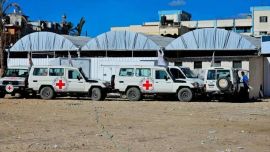The Hospital Posadas has had no patients admitted to its intensive care unit (ICU) for more than three weeks, but the ward’s head, Constanza Arias, refuses to relax: "There is always the spectre of another wave," she warns.
The last Covid-19 patient was discharged on September 22. "It was a great joy, but we are always fearful," says the doctor, who vividly remembers the mornings when she received five or six patients in critical condition, with the staff yet to be unvaccinated but devoted to taking care of the sick come what may.
Argentina, with a population of 45 million, has registered more than 5.2 million cases of Covid-19 and more than 115,500 deaths since March 2020.
Health authorities note that the contagion curve has been falling steadily for the past 20 weeks, along with the number of people in intensive care and fatalities.
From a peak of 7,839 patients in ICUs nationwide in May, the number has now fallen to 920 today, according to Health Ministry data.
"We've gone back, a little, to the dynamics of a normal intensive care [unit], to before the pandemic," says Arias, who says she remains shocked by "the influx of so many critical patients, at the same time," that the hospital in El Palomar, Buenos Aires Province, experienced at the peak of the virus crisis.
Lost colleagues
Intensive care physician Alberto Maceira took over as director of the Professor Alejandro Posadas National Hospital (to use its full mame) in January 2020, just two months before the start of the pandemic.
"Every colleague who died generated a great deal of pain. We all had a hard time. I think the worst thing that can happen to us is for a colleague to get sick and die. It's going to be hard for many of us to get it out of our minds," he says.
Last year, more than half of the hospital's staff fell ill with Covid-19. Many died, said Maceira.
Without a doubt, Argentina’s vaccination campaign, which began in January, has had an impact. More than 53 percent of the population have now been fully vaccinated and there have been no infections at all at the hospital in 2021.
"Hopefully this will be the end, or that the disease will remain endemic or sporadic,” he says, hoping there will be no return to “40,000 cases per day."
‘Covid-23 and Covid-25’
Diego Rivero, 52, was hospitalised for 11 days in April this year, put on oxygen and corticoids. His daughters, aged 16 and 20, also fell ill with the coronavirus and had to be isolated in their home alone. A few days earlier, Diego’s 93-year-old mother, who lived with him, had passed away.
"The hard part was knowing that my daughters had Covid and not being able to do anything for them," he recalls.
Then, from his hospital bed, he told them what he would leave them if he passed. "I was very calm, because I felt I was doing the right thing, but it was like a bombshell for them, they took it as a farewell,” says Rivera.
Now vaccinated, the businessman is nevertheless sceptical that the danger has passed.
"I have the idea that this was one. I am convinced that there will be a ‘Covid-23,’ a ‘Covid-25.’ This possibility, of mass infection of more or less lethal diseases is not over for me. I think we are at the end of this one, but the next one is here, just around the corner," he declares.
related news
by Nina Negrón, AFP





















Comments